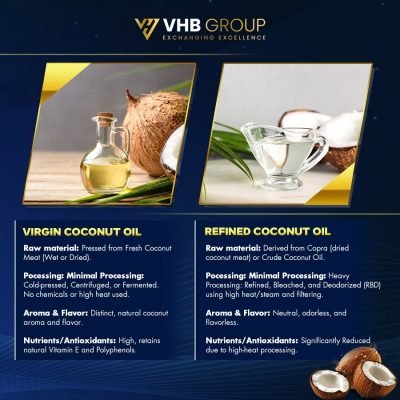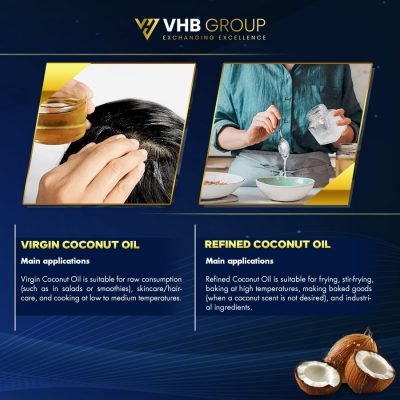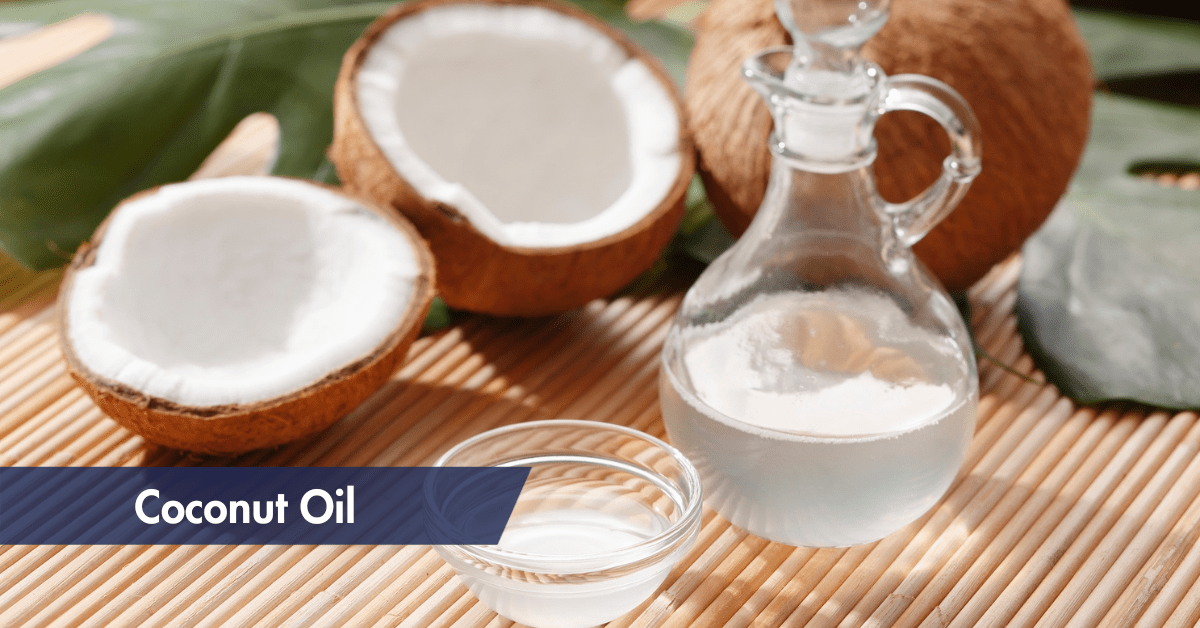Securing a competitive and reliable supply of coconut oil demands more than simply comparing prices. For industrial buyers, food manufacturers, and distributors, a precise understanding of the two primary types—Crude Coconut Oil (CCO) and Refined, Bleached, and Deodorized Coconut Oil (RBD CNO) is fundamental. Your choice dictates production cost, final product quality, and application suitability. This strategic guide explores the core differences in processing, characteristics, and ideal uses for both raw and refined coconut oil to empower your sourcing decisions.

Crude Coconut Oil (CCO): The Industrial Workhorse
It represents the raw, unrefined output of the initial coconut oil extraction. Manufacturers value this grade primarily for industrial applications where the natural color, strong aroma, and high Free Fatty Acid (FFA) content are non-issues, or where the oil will undergo further processing.
Coconut Oil Processing: Minimal and Natural
Producers press CCO directly from dried coconut meat, known as copra. This extraction involves expeller pressing and sometimes solvent extraction to maximize yield. The processing remains minimal, it bypasses the harsh chemical treatments and high-heat deodorization used later for the refined product. Because of this limited processing, It retains a darker, golden color and an intense, distinctive coconut aroma and flavor.
Key Characteristics of CCO
- Raw Material: Pressed from Copra (dried coconut meat).
- Processing: Minimal; typically expeller-pressed. No high heat or chemicals for refining.
- Aroma & Flavor: Strong, distinct, natural coconut oil scent.
- Nutrients/Antioxidants: High; retains natural Vitamin E and polyphenols better than RBD, though this is primarily an industrial raw material.
- Application Focus: CCO serves mainly as an industrial grade oil. Its primary applications include soap and detergent manufacturing, oleochemical production (for surfactants and lubricants), and as the raw material for creating Refined Coconut Oil (RBD CNO). Manufacturers rarely use CCO for direct food consumption due to its higher FFA and impurities.
Refined Coconut Oil (RBD CNO): The Versatile, Neutral Oil
It often labeled RBD (Refined, Bleached, Deodorized), is the highly processed, food-grade version of coconut oil. This extensive treatment removes the strong coconut flavor, odor, and impurities present in the crude form, making it exceptionally versatile for the food and cosmetic industries.
Production Processing: Rigorous Refining
The production of RBD CNO begins with Crude Coconut Oil or lower-grade copra. It undergoes three essential steps: refining, bleaching, and deodorizing.
- Refining: This step neutralizes the Free Fatty Acids (FFA), reducing the oil’s acidity and preventing rancidity.
- Bleaching: Filtration through activated clay removes pigments and residual impurities, resulting in a light, clear color.
- Deodorizing: Manufacturers use high-heat steam distillation to remove volatile compounds, effectively stripping the product of its characteristic scent and flavor.
This rigorous process ensures the resulting product is highly stable, neutral in flavor, and possesses a much higher smoke point, making it ideal for high-heat applications.
Key Characteristics of Refined Coconut Oil (RBD)
- Raw Material: Derived from Copra or CCO
- Processing: Heavy; Refined, Bleached, and Deodorized (RBD) using high heat/steam and filtering. This process is essential for achieving food-grade quality.
- Aroma & Flavor: Neutral, odorless, and flavorless. This allows RBD CCO to integrate seamlessly into formulations without affecting the final taste.
- Nutrients/Antioxidants: Significantly reduced compared to minimally processed oils due to the high-heat deodorization process.
- Application Focus: RBD CCO is a staple in the food industry for high-heat cooking, deep-frying, and baking. It acts as a base for margarine, shortenings, ice cream coatings, and processed foods. The cosmetic and pharmaceutical industries value its stability and neutral profile as a carrier oil and moisturizing base.
Strategic Sourcing: Matching CGrade to Application

The decision between Crude and Refined Coconut Oil depends entirely on the intended use.
- Choose CCO if your business uses the oil as a feedstock for further chemical processing (oleochemicals), soap production, or needs the lowest-cost base oil for non-food applications.
- Choose RBD CNO if your final product is for human consumption (cooking oil, baking, confectionery) or requires a stable, odorless, and colorless base (cosmetics, pharmaceutical carriers).
Understanding the precise process behind each grade of coconut products ensures you secure the right quality and specification for your B2B needs. This diligence guarantees product integrity and cost efficiency for your manufacturing or distribution chain.
Ready to optimize your coconut oil supply chain? We can provide detailed technical specifications and volume pricing for both oil products sourced from top-tier facilities.

